When things get too big they fall down, leaving behind the best: tiny nations, local government, & community that fits human beings. Author, permaculture teacher, and environmental lawyer Albert Bates shares the vision of the late Leopold Kohr. From the University of Reading UK, scientist Christopher O’Reilly warns extreme seasons and winter storms have been underestimated for the Northeast States, UK, and Northern Europe. A dive into the science of the real.
“There are those who, despite genetic or economic imperatives, stand in defiance of enormity.”
– Albert Bates
Download or listen to this Radio Ecoshock show in CD Quality (57 MB) or Lo-Fi (14 MB)
Download or listen to my 38 minute interview with Albert Bates in CD Quality or Lo-Fi
Download or listen to my 20 minute interview with Dr. Christopher O’Reilly in CD Quality or Lo-Fi
TIME TO GO LITTLE – ALBERT BATES & LEOPOLD KOHR
“Getting to Littleness”. This is the title of a late September blog from alternative thought-leader Albert Bates. Albert is not on “The Farm” – the famous counter-culture intentional community in Lewis County Tennessee. We reached him en route to a permaculture nature preserve in Belize, a little country on the Caribbean, just south of Mexico. As you will hear, Albert teaches permaculture and other course all over the world, through his Global Village Institute and the Cool Lab Project.
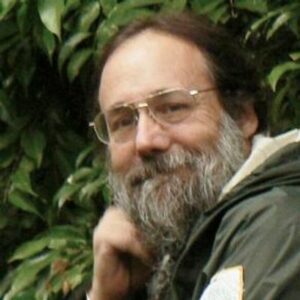
Albert Bates, permaculture teacher, community builder, author.
Before we join Albert Bates from the Yucatan, we hear from the writing of Leopold Kohr This comes from the late 1970’s when Earth had almost 5 billion people and Russia was the Soviet Union. As few recordings of Dr. Kohr exist, our quotes are read by a Radio Ecoshock volunteer. These selections come from Albert Bates.
[1] “The size of nations depends not only on the birth rate, it depends on integration. An integrated society is larger than the same number of people not integrated. And velocity, the speed at which a population begins to move, makes a society larger than one which moves more slowly.
So what we suffer from today is not a physical overpopulation, though it gets dangerous with five billion alive—but even with these five billion, two-thirds of the world is still empty, like Siberia with its immense emptiness. So what we suffer from is a velocity overpopulation. People, when they are integrated, have so many communications needs and centres to visit, tourist places to call on, that blows up the numerical population, which might be five billion. The velocity factor turns it into fifty billion, and it is that which suffocates us.
Now the only way of reducing this is not necessarily birth control, but size control of states, to reduce the distances each of us has to cover to perform our daily functions. Not decentralization but centralization writ small, the small community, which slows down the need for fast movements. And when we move slower, the effective population becomes smaller without a single person being killed.”
Let’s go back one article in Albert’s “Great Pause” series. On September 19, in The Medium, Albert Bates wrote about “Building Mouse Utopias”. American researcher John B. Calhoun found when animals get everything they need, they develop deep problems, like not reproducing. Male mouse Utopians attacked other mice, even wounding infants. It reminds us of the 260 shooting deaths over the 2021 Fourth of July weekend in the States. Can we think male violence is increasing not because of poverty, but affluence?
According to Dennis Meadows, co-author of the 1971 “Limits to Growth” study, the most dangerous time is not during the growth of empire, or even the time after it, but in the transition, when there appear to be no workable answers. That is where we are.
One series of solutions Albert Bates explores comes from Leopold Kohr. He is father to a dozen “Small is Beautiful”, “Live local” movements over the past half century. It continues: recently there was the “Addicted to Growth” conference in Sydney Australia.
I loved Leopold Kohr’s vision of velocity as a multiplier of population overshoot. It is not just that we are too many billions, but when we integrate and speed up our lives, things blow up beyond our control, beyond anyone’s control.
Conspiracy theorists long to find the central nexus in control of modern society. They want to find conniving billionaires and hidden bankers who work day and night to enslave us. But what if there is no one in control? What if we are twisting away from the natural world with no plan and no ability to stop?
On the other hand, Kohr would sympathize with some Libertarians. He said the real conflict of our age is not between left and right, or rich and poor, but between the individual and mass society. Leopold Kohr was pretty sure humans will not take rational action to shrink our demands on nature or each other. He thought it could be done, but what was his answer to the question “Will It Be Done?” – a Chapter with just one page, saying only “No!”.
As Bates writes in “Getting to Littleness”:
“Kohr believed that even though devolution from empire to small states was inevitable, no-one would believe in it soon enough to see it coming and plan for it.”
————————————————
[2] In an afterword penned for a US edition in 1978, to the “Breakdown of Nations” (written in 1957) Kohr wrote:
“When I proposed ten years later at the Boston convention of the American Economics Association that the question was no longer how to expand but how to contract; not how to grow but how to put limits to growth, I still drew nothing but blank stares from fellow economists, who dismissed my ideas by referring to me as a poet. “
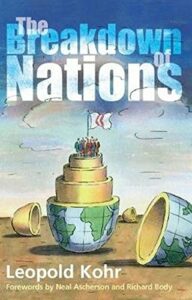
HOW A SOCIETY ENDS – LEOPOLD KOHR
[3] Leopold Kohr, read by our volunteer…
“A growing society, when it reaches a given point, has always exploded, like the supernova in the stars. So the annihilating element awaiting us all is not disunion but growth, overgrowth…”
[4] “It will not explode. Like the aging colossi of the stellar universe, it will gradually collapse internally, leaving as its principal contribution to posterity its fragments, the little states – until the consolidation process of big power development starts all over again. This is not pleasant to anticipate. What is pleasant, however, is the realization that, in the intervening period between the intellectual ice ages of great-power domination, history will in all likelihood repeat itself and the world, little and free once more, will experience another of those spells of cultural greatness which characterized the small-state worlds of the Middle Ages and Ancient Greece.”
THE TROUBLE WITH YOUNG PEOPLE TODAY… KOHR
[5] Kohr wrote in his 1978 Afterword to Breakdown of Nations…
“The young people of today have yet to grasp that the unprecedented change that has overtaken our time concerns not the nature of our social difficulties, but their scale. Like their elders, they have yet to become aware that what matters is no longer war, but big war; not unemployment, but massive unemployment; not oppression, but the magnitude of oppression; not the poor, who Jesus said will always be with us, but the scandalous number of their multitudes.
Nor have they as yet shown any understanding for the real conflict of this age, which is no longer between races, sexes, classes, left and right, youth and age, rich and poor, socialism and capitalism – all hangover confrontations from the past.
The real conflict of today is between Man and Mass, the Individual and Society, the Citizen and the State, the Big and the Small Community, between David and Goliath. But as long as our youth and campus leaders have the same tendency as their national leaders whom they want to succeed to measure their grandeur by the size of the organizations they command, there is little reason to assume that they will do more for smallness than provide it with an Ark and salute it in tribute to its poetry and beauty as it drifts away on the rising waters of the Deluge.”
[6] Late in his life, Leopold Kohr told CBC Canadian radio show “Ideas” on March 12, 1991.
“What animates the waves of water, as Da Vinci said, also explains the waves of wind, of sound and light. So this is a meta-economics, these are physics outside…beyond economics. And then I am at the door of economics, I open it and see another wave: business cycles. And the reason why economists can’t grasp this is that this structure of cycles has changed. These are no longer caused by the irregularities of business activities which produces spells; they have entirely different, non-economic, meta-economic, physical origins.
What we confront is size cycles. At a given size of integration, things become uncontrollable, not only by capitalist intervention, but by state intervention, by communist intervention. There are cyclical fluctuations and size cycles in the Soviet Union, but without a Marxist theory to explain it, it can’t be in a controlled economy. So they shoot the business managers. So this is what I mean. To understand economic phenomena, one must not mathematicize or statistify them, but philosophize them, go back to the laws of nature.”
[7] In his forward to the 1978 Dutton edition of Breakdown of Nations, Kirkpatrick Sale wrote
“In the real political world, in other words, there are limits, and usually fairly conscribed limits, beyond which it does not make much sense to grow. It is only in small states, Kohr suggests, that there can be true democracy, because it is only there that the citizen can have some direct influence over the governing institutions; only there that economic problems become tractable and controllable, and economic lives become more rational; only there that culture can flourish without the diversion of money and energy into statist pomp and military adventure; only there that the individual in all dimensions can flourish free of systematic social and governmental pressures.
Thus, the purposes of the modern world might better be directed not to the fruitless pursuit of one-worldism but to the fruitful development of small, coherent regions, not to the aggrandizement of states but to the breakdown of nations.”
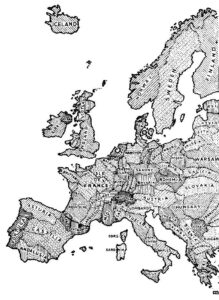
Albert Kohr’s vision of small-state Europe.
[8] My thanks to Albert Bates for his in-depth knowledge of Kohr and his works. All these quotes come from Albert’s article. He wants you to read them. We conclude with this quote from Leopold Kohr, from his own introduction to the 1957 edition of Breakdown of Nations, read by our Radio Ecoshock volunteer.
“Oversimplified as this may seem, we shall find the idea more easily acceptable if we consider that bigness, or oversize, is really much more than just a social problem. It appears to be the one and only problem permeating all creation. Wherever something is wrong, something is too big. If the stars in the sky or the atoms of uranium disintegrate in spontaneous explosion, it is not because their substance has lost its balance. It is because matter has attempted to expand beyond the impassable barriers set to every accumulation. Their mass has become too big. If the human body becomes diseased, it is, as in cancer, because a cell, or a group of cells, has begun to outgrow its allotted narrow limits.
And if the body of a people becomes diseased with the fever of aggression, brutality, collectivism, or massive idiocy, it is not because it has fallen victim to bad leadership or mental derangement. It is because human beings, so charming as individuals or in small aggregations, have been welded into overconcentrated social units such as mobs, unions, cartels, or great powers. That is when they begin to slide into uncontrollable catastrophe. For social problems, to paraphrase the population doctrine of Thomas Malthus, have the unfortunate tendency to grow at a geometric ratio with the growth of the organism of which they are part, while the ability of man to cope with them, if it can be extended at all, grows only at an arithmetic ratio. Which means that, if a society grows beyond its optimum size, its problems must eventually outrun the growth of those human faculties which are necessary for dealing with them.
Hence it is always bigness, and only bigness, which is the problem of existence, social as well as physical, and all I have done in fusing apparently disjointed and unrelated bits of evidence into an integrated theory of size is to demonstrate first that what applies everywhere applies also in the field of social relations; and secondly that, if moral, physical, or political misery is nothing but a function of size, if the only problem is one of bigness, the only solution must lie in the cutting down of the substances and organisms which have outgrown their natural limits. The problem is not to grow but to stop growing; the answer: not union but division.”
“Thus, the purposes of the modern world might better be directed not to the fruitless pursuit of one-worldism but to the fruitful development of small, coherent regions, not to the aggrandizement of states but to the breakdown of nations.”
That was from alternative economist Leopold Kohr, writing in his 1957 book “The Breakdown of Nations”.
BATES ON THE FOUR REACTIONS TO OVERGROWTH & COLLAPSE
“Toynbee’s studies of 28 civilizations and the conclusion that once a sustainable growth peak is exceeded, people resort to
archaism (idealization of the past),
futurism (idealization of the future),
detachment (removal from the realities of a decaying world; science; and authoritative sources of information), and
transcendence (meeting the challenges of the decaying civilization with new insight or by following some sort of charismatic prophet).”
================================================
PREVIOUS ALBERT BATES ECOSHOCK APPEARANCES
Posted on October 3, 2012, by Radio Ecoshock
From “The Farm” in Summertown, Tennessee, deep green thinker and activist Albert Bates on Tough Transition.
Posted on January 29, 2014, by Radio Ecoshock
SUMMARY: From The Farm in Tennessee, alternative guru Albert Bates rates responses to predictions of doom.
Posted on October 20, 2015, by Radio Ecoshock
SUMMARY: From 15th Annual International Permaculture Convergence in London, September 9th, 2015: “Cool Talk” by Albert Bates from The Farm in Tennessee. Albert interviews Transition Towns founder Rob Hopkins.
PERMACULTURE, CLIMATE & SURVIVAL #2
Posted on October 29, 2015, by Radio Ecoshock
SUMMARY: This is the second program from International Permaculture Convergence, in London. Keynote speech by internationally known Geoff Lawton. 3 interviews by Albert Bates: from UK, Andy Goldring of Permaculture Association; from Germany Declan Kennedy; from USA Andrew Millison.
===============================================================
CHRISTOPHER O’REILLY: UNDERESTIMATING EXTREMES
As world leaders meet, the best scientific predictions seriously underestimate how extreme weather will be, even just a couple of decades ahead. Who says so? Five scientists from University of Oxford, University of Edinburgh, and lead author Chris O’Reilly, now from University of Exeter [but formerly with Oxford]. Dr. Christopher O’Reilly is Royal Society Research Fellow at the University of Reading’s Department of Meteorology.
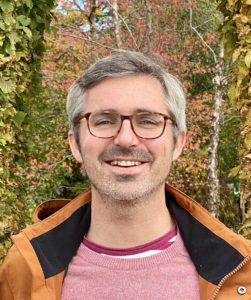
Dr. Christopher O’Reilly, Reading University.
They find: even the best projections are too tame for extreme weather events in the 2040s, especially for the U.S. Northeast and North European winters. The chances of more extreme seasons, including summer heat and drought, are also increasing as the planet warms.
We humans experience seasons year-by-year, but scientists see cycles that change over decades. This new paper was published in Nature Communications Earth & Environment on September 20, 2021. The title is: “Projections of northern hemisphere extratropical climate underestimate internal variability and associated uncertainty“. We won’t understand anything about it – unless we get the first two words of the paper: “internal variability”. Chris explains that for the non-scientist.
A major point is this: how we know recent extreme events, from heat to floods, are not part of a larger natural cycle, or within a historic range? This paper checks and finds the extreme weather many of us felt in 2021 is not “normal” – even when you count long cycles of ups and downs.
To be honest, this new paper is not really for public consumption. The methods employed are beyond most of us. We build trust because this group cross-checked a multitude of model runs against a record of hard observational data from the past one hundred years. They found global climate models more wrong about winters than summers.
TELECONNECTIONS
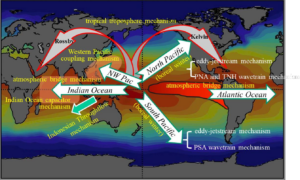
[Source illustration: El Niño-Southern Oscillation and Its Impact in the Changing Climate : Article National Science Review Apr 2018 Song Yang]
In the interview we also touch on teleconnection: where a change in one part of the world affects another system at a distance. Many cases have been documented, although we still don’t understand all the mechanisms.
In 2017, I spoke with Ivana Cvijanovic. She was one of five scientists from Lawrence Livermore National Lab who found “Future loss of Arctic sea-ice cover could drive a substantial decrease in California’s rainfall“. She explained a “double teleconnection”. In my words, a temperature change in the Arctic altered air in the Pacific that changed rains over California, like a chain reaction. Nature is complicated.
In another paper O’Reilly co-authored in June 2021, scientists look at “circumglobal teleconnection”.
EXTREME SEASONS
Getting back to the built-in variability of climate, the key question is: how can we know if wild weather we see is new, as opposed to the cold, heat, or storms reported in old newspapers and journals? Has our pollution of the atmosphere made weather more extreme? Perhaps for the first time, scientists can confirm we have left the realm of historic weather, with new extremes developing.
This team also looks at extreme seasons. I would say parts of the Northern Hemisphere just go through an extreme season in the summer of 2021. This paper suggests in coming decades we will go beyond extreme events in the mid-latitudes to entire extreme seasons. What is an “extreme season”? The paper says:
“Here we define an extreme season as the highest or lowest seasonal mean value over the baseline climate period, 1995–2014, representing a 1/20 year event based on a present-day climate period, which one could also estimate in the observational record.”
This paper just came out. Should we presume world leaders at the Edinburgh climate summit at the end of October will continue to use model projections that underestimate how extreme weather could become in coming decades? It seems with every new paper and interview, the future looks more murky and unstable than we thought. Am I just calling the wrong scientists? Not really. There is a very solid consensus in a variety of scientific fields that we are damaging the future. You need to know.
———————————————-
If you can help me pay the bills producing and hosting Radio Ecoshock, please either sign up as a monthly subscriber or make a one-time donation. There are no ads or pop-ups here or on the show. Nobody tracks you. Anyone in the world can get the show free – going back 15 years. No companies or governments fund this program, as scientists, activists and other experts share what they find. Your help powers Radio Ecoshock. Please find out how here.
Thank you for listening, and caring about our world!
Alex